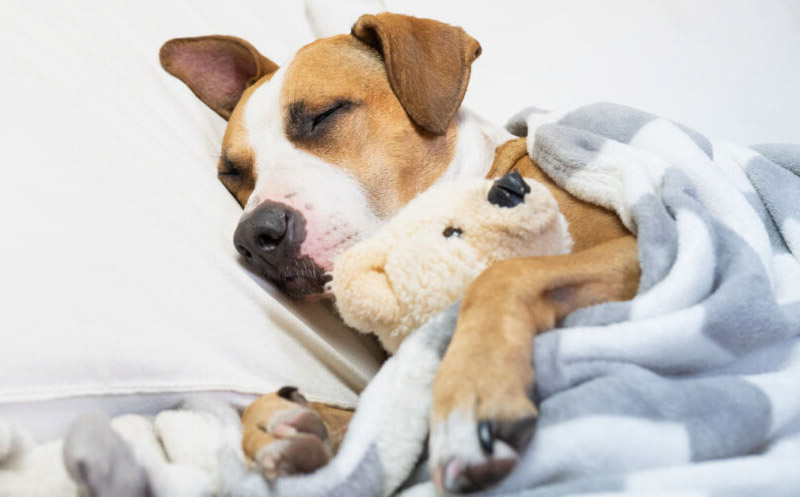If you have a dog that whines at night, you may be wondering why they do it and how you can make them stop. Whining is a common form of vocal communication in dogs, and it can have different meanings depending on the context and the tone. Sometimes, whining can indicate excitement, happiness, or anticipation, but other times, it can signal distress, anxiety, or frustration.

In this article, we will explore some of the possible causes of dog whining at night and provide you with some tips on how to stop this behavior and help your dog sleep better.
Causes of Dog Whining at Night
There are many reasons why dogs might whine at night, and some of them are:
- Separation anxiety: Some dogs may suffer from separation anxiety, which is a condition where they feel anxious or fearful when they are separated from their owners or their familiar environment. This can cause them to whine, bark, or howl at night, especially if they are left alone in a different room or a crate. Separation anxiety can be triggered by changes in the routine, moving to a new home, or losing a family member or another pet.
- Boredom: Dogs are social animals that need mental and physical stimulation to stay happy and healthy. If they do not get enough exercise or playtime during the day, they may become bored and restless at night, and whine to get your attention or to express their dissatisfaction. Boredom can also lead to other behavioral problems, such as chewing, digging, or destroying things.
- Pain or discomfort: Dogs may whine at night if they are feeling pain or discomfort due to an injury, illness, or age-related issues. For example, dogs with arthritis, hip dysplasia, or dental problems may whine because of the pain they experience when they lie down or move. Dogs may also whine if they are too hot or cold, hungry or thirsty, or need to go to the bathroom.
- Medical conditions: Some medical conditions can cause dogs to whine at night, such as urinary tract infections, kidney disease, or cognitive dysfunction syndrome. These conditions can affect the dog’s ability to control their bladder or their bowel movements, or cause them to be confused or disoriented. If your dog suddenly starts whining at night, or if their whining is accompanied by other symptoms, such as fever, vomiting, diarrhea, or blood in the urine, you should take them to the vet as soon as possible.
- Attention-seeking: Some dogs may whine at night simply because they want your attention or affection. They may have learned that whining gets them what they want, such as a treat, a toy, or a cuddle. This can be a result of inconsistent or excessive reinforcement of their whining behavior, or a lack of proper training and boundaries.

Tips to Stop Dog Whining at Night
If your dog whines at night, you may be tempted to comfort them or scold them, but neither of these options is effective or helpful. Comforting them may reinforce their whining behavior, while scolding them may increase their anxiety or fear. Instead, you should try to address the underlying cause of their whining and follow these tips:
- Addressing the underlying cause of the whining: The first step to stop your dog from whining at night is to identify and address the root cause of their behavior. If your dog has separation anxiety, you should consult a professional trainer or a behaviorist to help you with a desensitization and counterconditioning program, which involves gradually exposing your dog to the source of their anxiety and rewarding them for calm behavior. You can also try to make their sleeping area more comfortable and secure, by providing them with a cozy bed, a blanket, a toy, or an item that smells like you. If your dog is bored, you should provide them with adequate exercise and mental stimulation during the day, such as walks, games, puzzles, or training sessions. You can also give them a chew toy or a stuffed Kong before bedtime, to keep them occupied and satisfied. If your dog is in pain or discomfort, you should take them to the vet for a check-up and treatment. You can also ask your vet for advice on how to make your dog more comfortable at night, such as using orthopedic beds, heating pads, or supplements. If your dog has a medical condition, you should follow your vet’s instructions on how to manage it and monitor your dog’s symptoms. You can also ask your vet for recommendations on how to help your dog sleep better, such as using medications, supplements, or natural remedies.
- Providing adequate exercise and mental stimulation: One of the best ways to stop your dog from whining at night is to make sure they are tired and happy before bedtime. You should provide your dog with at least 30 minutes of moderate to vigorous exercise every day, depending on their age, breed, and health. You should also engage your dog in fun and challenging activities that stimulate their mind, such as training, games, puzzles, or agility. This will help your dog burn off excess energy, reduce stress, and improve their mood and behavior.
- Creating a consistent bedtime routine: Dogs thrive on routine and predictability, so you should establish a consistent bedtime routine for your dog and stick to it. You should feed your dog at the same time every day, preferably a few hours before bedtime, to avoid digestive issues or hunger. You should also take your dog out for a final potty break before bedtime, and make sure they have access to fresh water. You should then put your dog in their sleeping area, which should be quiet, dark, and comfortable, and say goodnight. You should avoid any stimulation or excitement before bedtime, such as playing, petting, or talking to your dog, as this can make them more alert and restless. You should also avoid letting your dog sleep in your bed, as this can create dependency and confusion, and make them more likely to whine at night.
- Ignoring whining behavior: If your dog whines at night for attention or affection, you should ignore them completely, as any response from you, positive or negative, can reinforce their behavior. You should not look at them, talk to them, touch them, or give them what they want, as this will only teach them that whining works. You should only respond to your dog if you think they need something, such as water, food, or a potty break, or if they are in pain or distress. Otherwise, you should wait until they stop whining, and then reward them with praise, a treat, or a toy. This will help your dog learn that whining does not get them anything, but being quiet does.
- Using positive reinforcement: Positive reinforcement is the most effective and humane way to train your dog and modify their behavior. You should use positive reinforcement to teach your dog to be quiet and calm at night, by rewarding them with praise, treats, or toys whenever they display the desired behavior. You should also use positive reinforcement to teach your dog a cue, such as “quiet” or “settle”, that tells them to stop whining and relax. You can do this by saying the cue when your dog is already quiet and calm, and then rewarding them. You can then gradually increase the duration and difficulty of the cue, until your dog can respond to it even when they are whining or excited. You should always use a calm and gentle tone of voice when giving the cue, and avoid yelling or scolding your dog, as this can make them more anxious or fearful.

Conclusion
Dog whining at night can be a frustrating and annoying problem, but it can also be a sign of a deeper issue that needs to be addressed. By understanding the causes of dog whining at night and following the tips we provided, you can help your dog stop this behavior and sleep better. You can also improve your relationship with your dog and make them happier and healthier.
